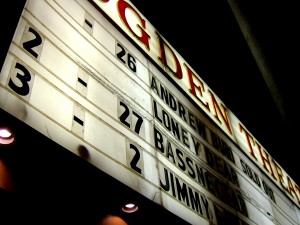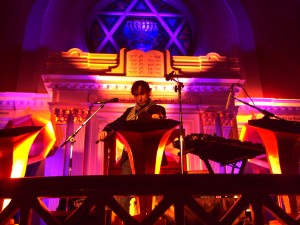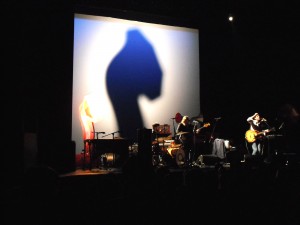 For me, this whole Andrew Bird thing has always come back to Armchair Apocrypha.
For me, this whole Andrew Bird thing has always come back to Armchair Apocrypha.
2008. In January I drop everything and move to Colorado. February rolls around, and Wilco starts their five-night stand at the Riviera where they play every song on every studio album and then some, featuring guest horn section — and guest violin, courtesy of a guy named Andrew Bird. I download the tapes. (“Andrew gets free rein,” Jeff Tweedy says on night three. “He’s a free-range Bird.”) By this point I know Wilco’s oeuvres, live and studio, well enough to be able to hear exactly what Bird adds to “Jesus, Etc.”, “Remember The Mountain Bed”, “Less Than You Think”, “Blood of the Lamb”, and “Red-Eyed and Blue”. I like what I hear. I like it a lot. In May I see that Leo Kottke is playing in Aspen in July, and this Andrew Bird fellow is playing the same venue on the night before. It’s worth some research. On a Saturday shortly thereafter when I’m feeling frustrated and sad, I drop by the record store, pick up Armchair Apocrypha, slip the CD in the player, and get on the highway up to Boulder just to get out of the house and into the sunshine. Andrew Bird has me from the first chord of “Fiery Crash”. I gun the engine; I never look back.
It’s three years later and I’m three years older. In August I’m leaving Colorado for at least two years, and maybe-probably for good. This spring I’ve been listening to the album a lot — and the Soldier On EP, which I regard as mostly a thematic extension of Armchair Apocrypha. I know Bird’s catalog at least as well as I know Wilco’s catalog, but Armchair Apocrypha is still my favorite.
I’ve been asking myself why that is. It’s not as though I don’t love his other work, and what I find the most interesting about his music — how he interacts with the music of Charley Patton and the Mississippi Sheiks, the drafting and re-drafting — isn’t really on display on Armchair Apocrypha alone.
What sets Armchair Apocrypha apart for me aurally is a sense of orderliness that I don’t hear on his other albums. That first chord of “Fiery Crash” — there’s so much reverb on it that by the time the riff kicks in, I’ve heard lasting echoes that come back in a way that sounds like I’m in a room with the source of the sound. It’s simple theatricality, ably assisted by structured rhythm, and the theatricality carries over through the rest of the album like a quiet affirmation that creates a private performance space: there’s no one in the place except for you and me.
 The subject material of the lyrics doesn’t differ all that much from the usual, though I’d argue that it’s a little more outward-looking than the rest of his work. “Scythian Empires” draws direct connections between present-day end of empire and Scythia in the 4th century BCE. “Heretics” addresses modern evangelical Christianity, at least in part. Even the intimacy of “Armchairs” literally spans time and space. But Bird doesn’t neglect his usual themes, either; “Armchairs” also spans the distance between two people in two chairs, and the history and exploration continue: and I was a cartographer of the tangles in your hair. The relationship between the two is a microcosm of the bigger, more global issues under discussion — and while that’s a theme that shows up over and over again on Bird’s albums, the anchoring of global issues to specific times, places, people, and objects is not.
The subject material of the lyrics doesn’t differ all that much from the usual, though I’d argue that it’s a little more outward-looking than the rest of his work. “Scythian Empires” draws direct connections between present-day end of empire and Scythia in the 4th century BCE. “Heretics” addresses modern evangelical Christianity, at least in part. Even the intimacy of “Armchairs” literally spans time and space. But Bird doesn’t neglect his usual themes, either; “Armchairs” also spans the distance between two people in two chairs, and the history and exploration continue: and I was a cartographer of the tangles in your hair. The relationship between the two is a microcosm of the bigger, more global issues under discussion — and while that’s a theme that shows up over and over again on Bird’s albums, the anchoring of global issues to specific times, places, people, and objects is not.
These specific cultural contexts to the big-issue subjects that exist in Armchair Apocrypha carry over to Soldier On, even though the majority of the songs are more tightly focused on the relationship as microcosm. “Sic of Elephants” reads as an anti-GOP screed. A reference in “The Trees Were Mistaken” to ‘nucular’ is difficult not to read as a reference to George W. Bush, especially considering that Soldier On was released in November 2007. (Armchair Apocrypha came out in March 2007, with its Halliburton reference in the first verse of “Scythian Empires”.) These may not be Andrew Bird’s only references to current political events in his work, but they’re certainly the most blatant — and these two tracks set the tone for the rest of the EP.
Next come slightly different versions of “Plasticities” and “Heretics” from Armchair Apocrypha, the former with a looped vocal on the chorus, making Bird sound like a full chorus, emphasizing the we in the promise that we’ll fight for your music halls and dying cities. The latter takes a different route in its sideways discussion of evangelical Christianity: it’s stripped down, more plaintive and solitary, just Bird and a guitar. The overall effect — since either way, it’s just Bird — is far more lonely than Armchair Apocrypha ever gets. A reworking of “The Water-Jet Silice” (first seen on Fingerlings 3 in 2006) immediately prior, this time with lyrics, doesn’t help; tales of ritual-self torture, the lines go, and that’s what a cilice is for.
An early version of “Sectionate City” that bears strong similarities to “Dissent” from Useless Creatures separates the Armchair Apocrypha reworkings from the last two tracks, which are covers. “How You Gonna Keep ‘Em Down On The Farm” is a WWI-era standard — and one that’s just as lonely as the preceding tracks. It deals with the inevitability of loss as progress happens. The song is so tied to a specific time, place, and event that while its discussion of impending, unavoidable loss — or maybe growing up — feeds well into the loneliness of the album, it also treats neatly with the discussion of American politics happening more overtly at the beginning of the EP, and more covertly on Armchair Apocrypha.
Soldier On ends with a cover of Bob Dylan’s “Oh Sister” — a song that Bird often uses as an encore at his live shows. And is our purpose not the same on this earth? the song asks. We grew up together from the cradle to the grave, died and then reborn and then mysteriously saved. As the end of the postscript to Armchair Apocrypha, “Oh Sister” gives the final word to the model Bird also uses in “Armchairs”, though with a different final result — the relationship, the loss, the ways we learn to deal with loss, and the ways we pick up and move forward. The cyclical history, personal and global. The end of one empire, the beginning of another.
 It’s worth mentioning, I think, that one of Bird’s new songs — “The Lazy Projector”, performed at the gezelligheid shows last December and also performed last Friday night in Brooklyn — takes a line from “Armchairs” and embellishes it: History repeats itself, it goes, and time’s a crooked bow. The latter half of that line is from “Armchairs”, which continues, Time you need to learn to love the ebb just like the flow.
It’s worth mentioning, I think, that one of Bird’s new songs — “The Lazy Projector”, performed at the gezelligheid shows last December and also performed last Friday night in Brooklyn — takes a line from “Armchairs” and embellishes it: History repeats itself, it goes, and time’s a crooked bow. The latter half of that line is from “Armchairs”, which continues, Time you need to learn to love the ebb just like the flow.
History repeats itself. Time’s a crooked bow. There will be an ebb; it’s best to learn to deal with it. Both The Mysterious Production of Eggs and Noble Beast touch on this theme — but in terms of nameless horrors in a big scary world and in terms of natural processes that can’t be stopped. Armchair Apocrypha calls the nameless horrors out for what they are and describes them (and offers the best coping mechanisms, as far as I’m concerned, in “Dark Matter” and “Simple X”). Soldier On, as a postscript, brings those horrors and processes down to a level that’s personal, a level it’s possible to deal with — because it will happen again, and that’s okay.
We’re closer to a new album, according to an interview in the Huffington Post from last week. I’ll be interested to see how Bird approaches these themes again (because I don’t think they’re going anywhere). Sarah may get a hint this weekend in Ann Arbor; I may get a hint in August, when I’m at both of the Colorado shows.
And as for where I am with Armchair Apocrypha three years later —
The shows in Arvada and Boulder happen four days after my last day of work and three days before I leave Colorado to attend graduate school. Lately I’ve been listening to a lot of music about change… but it always comes back to Armchair Apocrypha. It’s just something about the way it makes me want to gun an engine and never look back.
Andrew Bird: Official Website | MySpace | Twitter | Store
On Andrew Bird’s “Armchair Apocrypha”
By Mel on June 16, 2011
2008. In January I drop everything and move to Colorado. February rolls around, and Wilco starts their five-night stand at the Riviera where they play every song on every studio album and then some, featuring guest horn section — and guest violin, courtesy of a guy named Andrew Bird. I download the tapes. (“Andrew gets free rein,” Jeff Tweedy says on night three. “He’s a free-range Bird.”) By this point I know Wilco’s oeuvres, live and studio, well enough to be able to hear exactly what Bird adds to “Jesus, Etc.”, “Remember The Mountain Bed”, “Less Than You Think”, “Blood of the Lamb”, and “Red-Eyed and Blue”. I like what I hear. I like it a lot. In May I see that Leo Kottke is playing in Aspen in July, and this Andrew Bird fellow is playing the same venue on the night before. It’s worth some research. On a Saturday shortly thereafter when I’m feeling frustrated and sad, I drop by the record store, pick up Armchair Apocrypha, slip the CD in the player, and get on the highway up to Boulder just to get out of the house and into the sunshine. Andrew Bird has me from the first chord of “Fiery Crash”. I gun the engine; I never look back.
It’s three years later and I’m three years older. In August I’m leaving Colorado for at least two years, and maybe-probably for good. This spring I’ve been listening to the album a lot — and the Soldier On EP, which I regard as mostly a thematic extension of Armchair Apocrypha. I know Bird’s catalog at least as well as I know Wilco’s catalog, but Armchair Apocrypha is still my favorite.
I’ve been asking myself why that is. It’s not as though I don’t love his other work, and what I find the most interesting about his music — how he interacts with the music of Charley Patton and the Mississippi Sheiks, the drafting and re-drafting — isn’t really on display on Armchair Apocrypha alone.
What sets Armchair Apocrypha apart for me aurally is a sense of orderliness that I don’t hear on his other albums. That first chord of “Fiery Crash” — there’s so much reverb on it that by the time the riff kicks in, I’ve heard lasting echoes that come back in a way that sounds like I’m in a room with the source of the sound. It’s simple theatricality, ably assisted by structured rhythm, and the theatricality carries over through the rest of the album like a quiet affirmation that creates a private performance space: there’s no one in the place except for you and me.
These specific cultural contexts to the big-issue subjects that exist in Armchair Apocrypha carry over to Soldier On, even though the majority of the songs are more tightly focused on the relationship as microcosm. “Sic of Elephants” reads as an anti-GOP screed. A reference in “The Trees Were Mistaken” to ‘nucular’ is difficult not to read as a reference to George W. Bush, especially considering that Soldier On was released in November 2007. (Armchair Apocrypha came out in March 2007, with its Halliburton reference in the first verse of “Scythian Empires”.) These may not be Andrew Bird’s only references to current political events in his work, but they’re certainly the most blatant — and these two tracks set the tone for the rest of the EP.
Next come slightly different versions of “Plasticities” and “Heretics” from Armchair Apocrypha, the former with a looped vocal on the chorus, making Bird sound like a full chorus, emphasizing the we in the promise that we’ll fight for your music halls and dying cities. The latter takes a different route in its sideways discussion of evangelical Christianity: it’s stripped down, more plaintive and solitary, just Bird and a guitar. The overall effect — since either way, it’s just Bird — is far more lonely than Armchair Apocrypha ever gets. A reworking of “The Water-Jet Silice” (first seen on Fingerlings 3 in 2006) immediately prior, this time with lyrics, doesn’t help; tales of ritual-self torture, the lines go, and that’s what a cilice is for.
An early version of “Sectionate City” that bears strong similarities to “Dissent” from Useless Creatures separates the Armchair Apocrypha reworkings from the last two tracks, which are covers. “How You Gonna Keep ‘Em Down On The Farm” is a WWI-era standard — and one that’s just as lonely as the preceding tracks. It deals with the inevitability of loss as progress happens. The song is so tied to a specific time, place, and event that while its discussion of impending, unavoidable loss — or maybe growing up — feeds well into the loneliness of the album, it also treats neatly with the discussion of American politics happening more overtly at the beginning of the EP, and more covertly on Armchair Apocrypha.
Soldier On ends with a cover of Bob Dylan’s “Oh Sister” — a song that Bird often uses as an encore at his live shows. And is our purpose not the same on this earth? the song asks. We grew up together from the cradle to the grave, died and then reborn and then mysteriously saved. As the end of the postscript to Armchair Apocrypha, “Oh Sister” gives the final word to the model Bird also uses in “Armchairs”, though with a different final result — the relationship, the loss, the ways we learn to deal with loss, and the ways we pick up and move forward. The cyclical history, personal and global. The end of one empire, the beginning of another.
History repeats itself. Time’s a crooked bow. There will be an ebb; it’s best to learn to deal with it. Both The Mysterious Production of Eggs and Noble Beast touch on this theme — but in terms of nameless horrors in a big scary world and in terms of natural processes that can’t be stopped. Armchair Apocrypha calls the nameless horrors out for what they are and describes them (and offers the best coping mechanisms, as far as I’m concerned, in “Dark Matter” and “Simple X”). Soldier On, as a postscript, brings those horrors and processes down to a level that’s personal, a level it’s possible to deal with — because it will happen again, and that’s okay.
We’re closer to a new album, according to an interview in the Huffington Post from last week. I’ll be interested to see how Bird approaches these themes again (because I don’t think they’re going anywhere). Sarah may get a hint this weekend in Ann Arbor; I may get a hint in August, when I’m at both of the Colorado shows.
And as for where I am with Armchair Apocrypha three years later —
The shows in Arvada and Boulder happen four days after my last day of work and three days before I leave Colorado to attend graduate school. Lately I’ve been listening to a lot of music about change… but it always comes back to Armchair Apocrypha. It’s just something about the way it makes me want to gun an engine and never look back.
Andrew Bird: Official Website | MySpace | Twitter | Store
Related posts:
Posted in Commentary | Tagged andrew bird